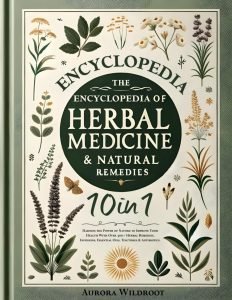What Is It Called When You Only Use Natural Medicine?
Have you ever wondered about the terminology for exclusively using natural medicine? Well, wonder no more! In this article, we will explore the term for this practice and dive into the reasons why some people choose to solely rely on natural remedies. Whether you are curious or considering incorporating more natural medicine into your own life, this article will provide you with valuable insights and guidance. So, let’s embark on a journey to discover what it’s called when you solely use natural medicine!

Definition of Natural Medicine
Overview of natural medicine
Natural medicine, also referred to as naturopathy or alternative medicine, is a holistic approach to healing and maintaining health that relies on natural remedies, practices, and therapies. It encompasses a wide range of modalities, including herbal medicine, acupuncture, chiropractic, traditional Chinese medicine, and Ayurveda, all of which aim to restore balance and harmony within the body. Natural medicine focuses on addressing the root causes of health issues rather than merely alleviating symptoms.
Explanation of natural medicine vs. conventional medicine
Unlike conventional medicine, which primarily utilizes pharmaceutical drugs and surgical interventions, natural medicine takes a more holistic and preventive approach. While conventional medicine often focuses on treating symptoms, natural medicine aims to identify and address the underlying causes of illness or imbalance. In natural medicine, the emphasis is on nurturing the body’s innate healing capacity and promoting overall well-being through various techniques and therapies. Natural medicine and conventional medicine can work together synergistically, with natural medicine supporting and enhancing the outcomes of conventional treatments.
Philosophy and Principles
Holistic approach
One of the fundamental principles of natural medicine is the acknowledgement that health and well-being are influenced by various interconnected factors. Rather than viewing the body as a collection of isolated parts or symptoms, natural medicine takes a holistic approach that considers the physical, mental, emotional, and spiritual aspects of health. This philosophy recognizes that each individual is unique and that optimal health requires achieving balance and harmony across all these dimensions.
Balance and harmony
Natural medicine perceives ill health as a result of imbalances within the body. The goal is to restore harmony by addressing not only the symptoms but also the underlying causes. By promoting balance, natural medicine aims to support the body’s natural healing processes and enable it to function optimally.
Prevention and self-care
In natural medicine, prevention is considered paramount. Emphasis is placed on lifestyle modifications, such as healthy eating, exercise, stress management, and adequate sleep, to prevent the development of diseases and maintain optimal health. Natural medicine also empowers individuals to take an active role in their own healthcare through self-care practices, education, and awareness.
Individualized treatment
Recognizing that each person is unique, natural medicine approaches treatment on an individual basis. Practitioners take into account an individual’s specific health concerns, medical history, lifestyle, and preferences to develop personalized treatment plans. This tailored approach ensures that the treatment addresses the underlying factors contributing to the individual’s health issues.
Emphasis on natural remedies
Natural medicine utilizes a range of natural remedies, including herbs, plant-based medicines, supplements, and nutritional interventions. These remedies work synergistically with the body’s natural healing processes, supporting and enhancing its capacity to restore balance and achieve optimal health. Natural remedies are chosen for their ability to address specific conditions or imbalances while minimizing the risk of side effects.
Types of Natural Medicine Practices
Herbal medicine
Herbal medicine is one of the oldest and most widely known natural medicine practices. It involves the use of plants and plant extracts for their therapeutic properties. Herbal remedies can be consumed in various forms, such as teas, tinctures, capsules, or topical preparations, depending on the intended purpose.
Traditional Chinese medicine
Traditional Chinese medicine (TCM) is a comprehensive system of healthcare that has been practiced for thousands of years. It includes various modalities such as acupuncture, Chinese herbal medicine, dietary therapy, and Qi Gong. TCM seeks to restore balance and harmony by addressing imbalances in the flow of energy, known as Qi, within the body.
Ayurveda
Originating in India over 5,000 years ago, Ayurveda is a holistic healing system that focuses on achieving balance among body, mind, and spirit. Ayurvedic practices include dietary adjustments, herbal remedies, yoga, meditation, and cleansing techniques. The goal is to maintain or restore balance by identifying an individual’s unique constitution, known as doshas, and prescribing personalized treatments accordingly.
Homeopathy
Homeopathy is a system of medicine developed in the late 18th century by Samuel Hahnemann. It is based on the principle of “like cures like,” where highly diluted substances are administered to stimulate the body’s innate healing response. Homeopathic remedies are chosen based on the individual’s symptoms and constitution.
Naturopathy
Naturopathy combines various natural healing modalities, including herbal medicine, clinical nutrition, homeopathy, lifestyle counseling, and hydrotherapy, among others. Naturopathic doctors aim to address the root causes of health issues through a combination of therapies and foster the body’s self-healing abilities.
Chiropractic
Chiropractic medicine focuses on the relationship between the spine and the nervous system and its impact on overall health. Chiropractors use manual adjustments and manipulations to restore proper alignment, reduce pain, and improve the body’s ability to heal itself.
Acupuncture
Acupuncture involves the insertion of fine needles into specific points on the body to stimulate the flow of energy and restore balance. It is a key component of Traditional Chinese Medicine and has been used for thousands of years to alleviate pain, promote relaxation, and address a variety of health conditions.
Massage therapy
Massage therapy incorporates various techniques to manipulate the body’s soft tissues, promote relaxation, and alleviate muscle tension. It can provide physical and mental benefits, including pain relief, stress reduction, improved circulation, and enhanced overall well-being.
Meditation and mindfulness
Meditation and mindfulness practices are utilized in natural medicine to promote relaxation, reduce stress, and enhance mental and emotional well-being. These practices involve focusing one’s attention and cultivating a state of present-moment awareness, which can have profound effects on overall health.
Benefits of Natural Medicine
Reduced risk of side effects
One of the key advantages of natural medicine is the relatively low risk of side effects compared to many conventional treatments. Natural remedies, when used properly, tend to have a gentler impact on the body and are less likely to cause adverse reactions or long-term complications.
Enhanced overall well-being
Natural medicine places a strong emphasis on promoting overall well-being, not just treating specific symptoms or diseases. By addressing the root causes of health issues and focusing on holistic approaches, natural medicine aims to improve an individual’s physical, mental, and emotional health, leading to a greater sense of well-being and vitality.
Addressing underlying causes
Rather than merely alleviating symptoms, natural medicine aims to identify and address the underlying causes of health issues. By treating the root causes, natural medicine can provide long-lasting relief and support the body’s ability to heal itself.
Supporting the body’s natural healing processes
Natural medicine works in harmony with the body’s innate healing mechanisms, supporting and enhancing its ability to heal itself. By providing the body with the necessary tools, such as nutritional interventions, herbal remedies, and lifestyle modifications, natural medicine helps create an optimal environment for healing and restoration.
Promoting long-term health
By focusing on preventive measures, individualized treatments, and underlying causes, natural medicine aims to promote long-term health and well-being. It emphasizes lifestyle changes and self-care practices that can have a lasting positive impact on an individual’s health.
Personal empowerment and active participation in healthcare
Natural medicine empowers individuals to take an active role in their own healthcare. It encourages patients to become informed about their bodies, make educated choices, and actively participate in their healing journey. This approach fosters a sense of personal responsibility and involvement, ultimately leading to better health outcomes.

Drawbacks of Natural Medicine
Limited scientific evidence
One of the drawbacks of natural medicine is the limited scientific evidence available for some practices and remedies. Due to the variation in individual responses and the complexity of holistic approaches, it can be challenging to conduct large-scale clinical trials that meet conventional scientific standards. This limited evidence can make it difficult for some individuals to fully embrace natural medicine or for healthcare professionals to recommend it more widely.
Potential interactions with conventional medications
Natural remedies and conventional medications can sometimes interact with one another, potentially leading to adverse effects. It is important to consult with healthcare professionals, including both natural medicine practitioners and conventional doctors, to ensure safe and appropriate integration of treatments and to minimize the risk of potential interactions.
Not suitable for acute or emergency situations
Natural medicine is generally more effective for chronic conditions or long-term health management rather than acute or emergency situations. In situations requiring immediate medical attention, conventional medicine should be the primary course of action. Natural medicine can complement conventional treatments but may not provide the necessary rapid response for acute conditions.
Individual variability in efficacy
As with any form of treatment, individual responses to natural medicine can vary. What works well for one person may not have the same effect on another. Some individuals may find natural medicine to be highly effective, while others may not experience the desired results. It is important to consult with a qualified practitioner to determine the most appropriate course of treatment for each individual.
Reliance on self-diagnosis
Natural medicine often encourages individuals to take responsibility for their own health. While this can empower individuals to make informed choices, it can also lead to self-diagnosis and self-treatment, which may not always be accurate or effective. It is crucial to seek guidance from qualified natural medicine practitioners to ensure proper diagnosis and appropriate treatment.
Integration with Conventional Medicine
Complementary vs. alternative medicine
Natural medicine can be categorized as either complementary or alternative to conventional medicine. Complementary medicine refers to the use of natural medicine alongside conventional treatments, with the aim of enhancing the effectiveness of the overall treatment approach. Alternative medicine, on the other hand, refers to the use of natural medicine as a standalone treatment option.
Collaboration between natural medicine practitioners and healthcare professionals
To ensure optimal patient care, collaboration between natural medicine practitioners and healthcare professionals is essential. Open communication and a team-based approach allow for a holistic understanding of the patient’s health, enabling the integration of natural medicine and conventional treatments when appropriate. This collaboration ensures that patients receive comprehensive care that considers all available options.
Evidence-based recommendations
Both natural medicine and conventional medicine strive to provide evidence-based treatments, although the availability and quality of evidence may vary. To ensure the best outcomes, practitioners from both disciplines should refer to the latest research and clinical guidelines. By basing recommendations on sound scientific evidence, healthcare professionals can provide more comprehensive and informed advice to their patients.
Combining treatments for optimal outcomes
Natural medicine and conventional medicine can be successfully combined to provide optimal outcomes for patients. The synergy between these approaches can enhance the effectiveness of treatments while minimizing risks and side effects. Individualized treatment plans that incorporate both natural and conventional therapies can be tailored to meet the unique needs and preferences of each patient.

Legal and Regulatory Considerations
Licensing and certification of natural medicine practitioners
Different countries and regions have varying regulations regarding the licensing and certification of natural medicine practitioners. It is important to ensure that the practitioner you choose is licensed and adequately trained in their respective modality. This helps ensure that they have the necessary knowledge and skills to provide safe and effective treatments.
Regulation of natural health products
Natural health products, such as herbal remedies and supplements, may be subject to different regulatory frameworks depending on the country or region. These regulations may include standards for quality control, labeling, and safety. As a consumer, it is important to choose products that meet these regulatory requirements to ensure their safety and efficacy.
Legal status and scope of practice
The legal status and scope of practice for natural medicine practitioners can vary. Some countries or regions may have specific laws governing the practice of natural medicine, while in others, it may fall under more general healthcare regulations. It is crucial to be aware of the legal requirements and limitations to ensure that practitioners operate within the appropriate framework.
Consumer protection and quality control
Consumer protection and quality control are important considerations when choosing natural medicine products or practitioners. Reputable practitioners adhere to strict codes of ethics and maintain high standards of practice. Additionally, it is important to thoroughly research and choose reputable manufacturers and suppliers for natural health products to ensure their quality and safety.
Choosing a Natural Medicine Approach
Assessing personal health needs and goals
When considering a natural medicine approach, it is important to assess your personal health needs and goals. Take time to reflect on your specific health concerns, preferences, and desired outcomes. This self-evaluation will help guide you in choosing the most suitable natural medicine modalities and practitioners for your individual needs.
Researching and consulting reputable practitioners
Researching and consulting reputable practitioners is crucial when choosing a natural medicine approach. Look for practitioners who are properly trained, licensed, and experienced in their respective fields. Seek recommendations from trusted sources, read reviews, and ask for credentials to ensure that you are receiving care from knowledgeable and ethical professionals.
Considering potential risks and benefits
As with any form of healthcare, it is important to consider the potential risks and benefits of natural medicine. Evaluate the available evidence, research, and clinical experience regarding the specific modality or treatment you are considering. Take into account your individual health conditions, allergies, and medications to assess potential interactions or contraindications.
Making an informed decision
By gathering relevant information, weighing the advantages and disadvantages, and consulting with qualified practitioners, you can make an informed decision about pursuing a natural medicine approach. It is essential to be proactive in your healthcare decisions and actively participate in the selection and implementation of natural medicine practices that align with your beliefs and values.
Common Misconceptions
Natural medicine is always safe
While natural medicine is generally considered safe, it is not without potential risks or side effects. Herbal remedies, supplements, and other natural treatments can still interact with medications or cause adverse reactions in some individuals. It is important to consult with a qualified practitioner and disclose all relevant information to ensure the safe and appropriate use of natural medicine.
Natural medicine is ineffective
Some people may believe that natural medicine is ineffective due to limited scientific evidence or personal biases. While scientific research plays an essential role in evaluating the efficacy of natural medicine practices, anecdotal evidence and centuries of traditional use should not be discounted. Many individuals have experienced significant benefits from natural medicine approaches, highlighting their potential effectiveness.
Natural medicine is a replacement for conventional medicine
Natural medicine should not be viewed as a complete replacement for conventional medicine, especially in acute or emergency situations that require immediate medical attention. Instead, it is often best utilized as a complementary approach alongside conventional treatments. Open communication and collaboration between natural medicine practitioners and healthcare professionals can ensure that patients receive the most comprehensive care.
Natural medicine is based solely on anecdotal evidence
While anecdotal evidence plays a role in the development and understanding of natural medicine practices, it is not the sole basis for their efficacy. Many natural medicine modalities have centuries of traditional use and observational evidence supporting their effectiveness. However, the field of natural medicine is increasingly incorporating scientific research to further validate its efficacy and safety.

Conclusion
Natural medicine, with its emphasis on holistic approaches and natural remedies, has gained increasing popularity and acceptance in recent years. Its philosophy and principles, such as the focus on balance, prevention, and individualized treatment, resonate with those seeking alternative approaches to healthcare. Natural medicine offers a range of practices, from herbal medicine to acupuncture and meditation, all aimed at supporting the body’s natural healing processes and promoting overall well-being.
Personal responsibility in healthcare decisions is integral to natural medicine. By actively participating in the decision-making process, individuals can explore a variety of natural medicine options to determine what aligns best with their health needs and goals. Collaboration between natural medicine practitioners and conventional healthcare professionals ensures comprehensive and evidence-based care. As the field of natural medicine continues to evolve, its use as a complementary approach alongside conventional medicine may provide optimal health outcomes for individuals seeking a holistic approach to their healthcare.



